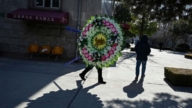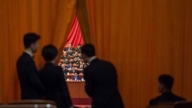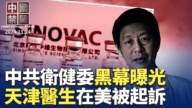【新唐人2015年01月21日讯】深圳房地产龙头企业佳兆业集团爆发美元债务违约,引发全球基金业紧张。据了解,佳兆业至今合计共超过20亿元(人民币)资产遭到冻结。与此同时,深圳杭州两地的大批房源遭到当局锁定,更引来外界对中国房地产这场不同寻常风波的关注。
深圳知名上市房企佳兆业(Kaisa Group Holdings Ltd.)违约风波蔓延,中国部分房地产股遭遇抛售,一系列房地产公司的物业交易被禁止。深圳城市规划和国土资源委员会在上周的声明说,中国海外发展有限公司修建的2,800套房屋,被禁止出售。
据大陆媒体15号的报导,佳兆业位于杭州五常的一个楼盘项目,其中的749套待售房源几乎全部被锁定。而据《华尔街日报》报导,杭州其他开发商的项目也受到影响。
根据《新浪网》的解释,佳兆业事件不会是个例,但不适合过度解读,报导引用专家分析说,市场应该关注这波动荡之下的并购机遇,尤其在上市房企再融资全面解禁后,更好的掘金机遇。
对此,旅美中国社会问题研究人士张健认为不太可能。
旅美中国社会问题研究人士张健:“因为在中国GDP外贸出口已经是日益见低,然后这个人民币兑美元的汇率也在贬值,国内通货膨胀加剧,最主要是工业制造业这个问题,可以说已经非常严峻,中国的制造业从去年开始已经进入寒冬期。”
根据香港《苹果日报》15号报导,大陆网站流传一份“深圳地产预警名单”,17家企业正陆续接受组织调查,其中大部分企业与中共江泽民派系有密切关系。
例如,花样年、佳兆业和曾庆红、周永康相关﹔信义玻璃由江派现任政治局常委张高丽亲家、玻璃大王李贤义创办﹔而益田吴群力则和花样年密切相关,2005年益田、花样年等5家房企发起的“新地产联盟”,曾庆红侄女曾宝宝担任第一届理事会主席。
张健:“与江派人马非常密切的这些厂商,其实就是江派的一个血库,如果断掉江派血库的话,那么整个江派就在未来对中国政局后续资金方面可能会受到箝制。因为政治上逐渐地清理以后,一定是要在经济领域上进行打击,而且这个打击对外来说,可以说是代表民意。”
中国问题专家章家敦1月19号在《福布斯》撰文认为,深圳杭州两地禁售的背后,可能是当局准备让某些开发商破产。叫停常规审批就是一个信号,这预示着地方政府承认,房价不久必须做出调整。
张健:“当地政府是不愿意去动本省市房地产的利益,那在个人乌纱帽和性命攸关之际,他们也把房地产作为一个弃车保帅的作用,先保住自己的乌纱帽,和这些江派有关系的,有千丝万缕联系的这些房地产商推出去。”
去年11月28号,佳兆业在深圳接近2000套房源被深圳市政府锁定﹔12月3号突然停牌,再到老板郭英成12月10号辞职,以及2015年初爆发贷款违约,违约金额达5,200万美元,成为中国2015年第一宗企业融资违约案,也是第一家房企美元债务违约案。
而佳兆业的债券价格从去年12月初以来,已重挫80%。花样年集团和上海恒盛控股等地产公司,也出现被调查以及股东逃离事件。分析指出,中国房地产行业还将遭遇更多麻烦。
大陆独立财经评论人士牛刀:“所有的资产集中在一个行业上面,这个国家怎么发展?它(中共)的央企很多都是僵尸企业,都要破产的,但是它(中共)顾不到那里,所以所有的矛盾它(中共)不让它爆发,但是有一天它(中共)通通hold不住了,那就整体性的毁灭。”
施罗德投资管理公司亚洲信贷研究主管Raymond Chia对媒体表示,经过佳兆业后,投资人如果还继续认为,不会有中国企业发生类似违约问题,是“不理性”的。
采访/易如 编辑/黄亿美 后制/郭敬
Kaisa Group Crisis Extends to Other Developers.
Shenzhen developer Kaisa Group’s default on offshore debts
set a nervous tone for the global funds industry.
It is understood that more than 2 billion yuan (RMB)
of Kaisa’s assets have been frozen.
Shenzhen and Hangzhou authorities banned the sale of
Kaisa’s apartments, which has caused widespread concerns.
Kaisa Group Holdings defaulted on debt payments and the
situation has extended.
This has caused market dumping of China’s property stocks
as well as governmental halt on property transaction.
Shenzhen’s Urban Planning Land and Resources Commission
stated in last week that 2,800 units constructed by China
Overseas Land & Investment were blocked from being sold.
Chinese media reported that Hangzhou stopped the sales
of almost all the apartments in Kaisa’s 749 unit project.
The projects of other developers in Hangzhou were
also affected, reported the Wall Street Journal
Chinese online media, Sina, explained, Kaisa won’t be an
isolated case but should not be over-interpreted.
Experts analyzed that the mergers and acquisitions under
this wave of unrest should be grand opportunity for profit,
especially after the complete lift of the refinance ban of
the listed real estate developers, said Sina.
Chinese social issue researcher Zhang Jian thinks otherwise.
Zhang Jian, “Chinese GDP and exports have been
continuously dropping.
The RMB against the US dollar also is devalued and domestic
inflation has intensified.
Most seriously, manufacturing in China has entered the
bitter winter season."
Hong Kong’s Apple Daily indicated a “warning list of
Shenzhen property" is being publicized online.
It is said that 17 companies are being interrogated and most
of them are closely connected to Jiang Zemin’s faction.
For example, property developers Fantasia and Kaisa are
related to Zeng Qinghong and Zhou Yongkang;
Xinyi Glass was co-founded by Zhang Gaoli, a member of the
Politburo Standing Committee, also from the Jiang faction;
The founder of Yitiang Group has had close interactions
with Fantasia;
Zeng Qinghong’s niece Zeng Baobao was the first president
of the New Alliance initiated in 2005 by five property
developers in Shenzhen, including Yitiang and Fantasia.
Zhang Jian, “Those companies with close connections
to Jiang are the life blood of the Jiang faction.
Breaking the companies’ hold will strangle the Jiang faction
control of the regime’s political sources.
Economic attack will surely follow the political clean up.
This attack will be considered an act
representing peoples’ minds."
China expert Gordon Chang wrote in his article in Forbes,
about two localities, Shenzhen and Hangzhou;
“Looks like they are switching their approach and trying
to put some builders out of business.
So the withholding of routine approvals could be a sign
that local governments acknowledge that prices will
have to adjust soon." he said.
Zhang Jian, “The local government would not have done
anything to affect the interests of local real estate,
unless it is to safeguard their own careers and lives.
To protect their titles, they have to abandon the developers
who have deep links to the Jiang faction."
On Nov. 28 2014 the Shenzhen government suddenly
blocked Kaisa selling nearly 2,000 apartments;
Kaisa’s stock trading was suspended on Dec. 3,
its boss Kwok Ying-shing resigned on Dec. 10.
Kaisa became the first developer in China to default
on a loan as high as $52 million in early 2015.
Kaisa’s bond prices have plummeted up to 80%
since December, 2014.
Fantasia and Shanghai Glorious have also been exposed
to be investigated and their shareholders fleeing.
China’s property industry anticipates being
faced with more trouble.
Independent financial commentator Niu Dao, “How can a
country develop normally when all assets were centralized
in one industry? Many state-owned enterprises are zombie
companies that are facing bankruptcy.
The regime can’t do anything about it but only hold back
all of the conflicts.
Once they can’t hold it any more, it will a total destruction."
Raymond Chia, Singapore-based head of Asia credit research
at Schroder Investment Management Ltd., said, “It would be
irrational to continue thinking that after Kaisa none of the
companies will see a similar fate。” reported Bloomberg.
Interview/YiRu Edit/Huang Yimei Post-Production/GuoJing




























